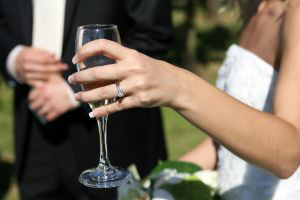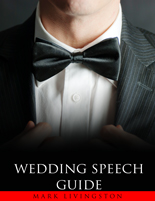In almost all cases your wedding toast follows your presentation.
 It becomes the “finale” of everything you’ve said leading up to it.
It becomes the “finale” of everything you’ve said leading up to it.
The toast differs from your speech in that it is brief.
It’s entirely appropriate for it to be succinct – a few short words before you and the guests raise your glasses in honor of the newlyweds.
Rarely is it very long – but there are exceptions that I’ll discuss later.
Usually, after your main speech, you’ll say something like, “Please join me in wishing the bride and groom long health and happiness in their marriage. To the bride and groom!” (And you will raise your glass.)
An alternative to that would be: “Would you all please rise and join me in wishing the bride and groom much happiness in their new life together.”
Wedding Speeches Table of Contents
MC Speeches | Father of the Groom | Order of Wedding Speeches and Toasts
One exception to a short toast is if you’re quoting something.
For example, you might quote a short poem, a proverb, a statement from someone famous, or part of a song.
In that case, it might be somewhat longer.
But keep in mind the longer you make this finale, the less impact and meaning it could have.
Toasting Exceptions
There are some exceptions to the traditional toast at the end of your presentation.
A toast can also be a “standalone” tribute in which case it is not preceded by a speech.
Instead, it is preceded by a brief introduction that immediately leads into asking the guests to raises their glasses to acknowledge the bride and groom.
Sometimes cultural traditions will involve the ritual of toasting the bride and groom. This entails going from table to table. If you have a large number of guests then this can take some time. This particular tradition should be taken into account when creating an agenda and timeline to ensure this event doesn’t run too long and that subsequent events start on time.
No matter which toast you give – a standalone one or one at the end of your tribute to the bride and groom – it usually has a general theme to it. And that’s to wish the bride and groom health, happiness, prosperity, and best wishes in their new life together.
There is one other exception to the traditional tribute to the newlyweds that you might not know about.
And that’s a special acknowledgement to someone who has made a noteworthy contribution to the planning.
In this case, it’s not the traditional accolade to the bride and groom.
For example, if the mother of the bride has contributed an enormous amount of time to the planning and preparation of the wedding or the bride’s parents have made a significant financial contribution then it’s entirely appropriate to acknowledge their contribution and how much it has meant to the newlyweds.
Whether you’re giving a wedding speech or toast it’s a good idea to make sure that the guests’ glasses are filled before this special event takes place.
Usually the MC will ensure this is done either by making a general announcement or making arrangements with the venue or catering personnel but you should still take note that it has been done.
It may or may not be appropriate to ask the guests to stand as you finish your presentation – the Master of Ceremonies or bride can give you guidance with this.
You can either ask your guests to raise their glasses or to stand and raise their glasses.
Giving a wedding toast – or speech – is a huge honor.
It’s not something to be taken lightly because it’s an acknowledgement of the special relationship you have with the bride and groom.
It also requires considerable thought, preparation, and practice to be effective.
So be sure to prepare early and choose your words wisely so that your toast ends on a high note and honors the newlyweds in their new life together as a couple.
Discover How To Create The Perfect Wedding Toast
If you don’t know what to say in your toast then take a moment to find out more about professionally prepared Wedding Toasts and Speeches Samples and how they can speed up your preparation time here
(the foregoing link will take you to a premier supplier of wedding toasts and speech examples for which I may receive compensation at no extra cost to you)

